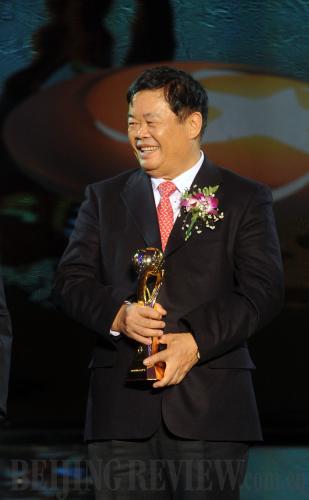|
Failed promise
 |
|
THE DEMANDING DONOR: Philanthropist Cao Dewang receives the Business Person of the Year Award for Social Benefit from China's national broadcaster CCTV at a ceremony on December 23, 2009 (CFP) |
In recent years, greater numbers of entrepreneurs have been involved in charity. Chen Guangbiao, Chairman of the Jiangsu Huangpu Recycling Resources Co. Ltd., has been dubbed the "philanthropy laureate" because of his donations of more than 1.1 billion yuan ($167.71 million) over the past decade, benefiting more than 500,000 people. He conducts 70 percent of the donations himself; the rest is done through charitable organizations.
While philanthropy in China may not be as common as in the West, the concept is growing more popular among the rich.
Last September, Bill Gates and Warren Buffett—the world's two top billionaires—held a charity banquet in Beijing. The dinner named "The Giving Pledge" aimed to convince Chinese magnates to donate their fortunes to a good cause. And the notion was echoed by some of China's richest. For example, Chen announced he would donate all his money, some $440 million yuan ($67.08 million), to charity when he dies.
Statistics show charity donations in China from home and abroad in 2010 added up to about 70 billion yuan ($10.67 billion), 43 of which were single donations with a value exceeding 100 million yuan ($15.25 million), in cash or securities.
But occasionally pledged donations were hollow promises. A recent audit found four out of 11 pledged donations, worth over 100 million yuan, failed to materialize last year as donors and recipients failed to follow through, according to compilers of the 2011 China Charity List, which is due on April 26.
The list, prepared by the China Philanthropy Times and China Association of Social Workers, will honor the top 10 Chinese philanthropists and companies, the yearly philanthropy star among other awards. Also this mega charity event will release an important annual report on China's philanthropy.
Donors and recipients who "vanish" pose a big obstacle for compilers of the list. Phone calls often went unanswered and some numbers didn't even exist. For example, a businessman known as Wang Jianzhong promised to donate 500 million yuan ($76.23 million) to the reconstruction of an ancient city in Datong City, north Shanxi Province, last August. But the Datong Government was unaware of the contribution, the office said.
The compilers said it's complicated work to investigate a donation and conduct follow-up work, as it needs the cooperation of donors, recipients and independent monitoring agencies. The work has met with difficulties as some donating businesses and foundations have layers of red tape to cut through.
2009 Figures
Social donations in China totaled 33.2 billion yuan ($5.06 billion) in 2009, up 3.5 percent year on year.
Individuals accounted for 30 percent of total contributions, and enterprises made up 58 percent.
Charity donations in China made up only 0.01 percent of its GDP, compared to 2.2 percent in the United States.
Lottery sales nationwide totaled 132.38 billion yuan ($20.18 billion), 46.3 billion yuan ($7.06 billion) of which was used for public welfare programs.
Guangdong Province, Beijing and Sichuan Province were the top three Chinese mainland regions in terms of the amount of donations received.
Education, disaster relief and social services were top three destinations of charitable giving, with 3.7 billion yuan ($564 million) used for elementary, vocational and higher education, among other educational sectors, making up more than 41 percent of the total donation amount.
(Source: Annual Report on China's Philanthropy in 2009)
| 